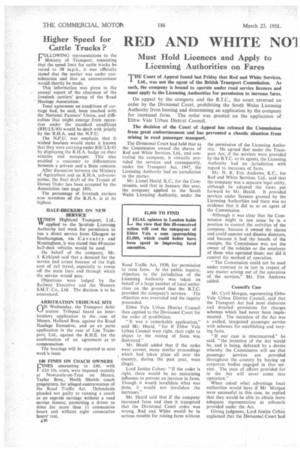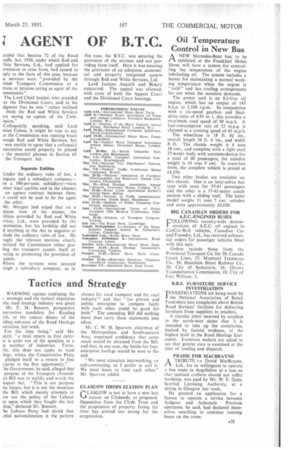RED AND WHITE NO1 AGENT OF B.T.C.
Page 32

Page 33

If you've noticed an error in this article please click here to report it so we can fix it.
Must Hold Licences and Apply to Licensing Authorities on Fares
THE Court of Appeal found last Friday that Red and White Services, I Ltd., was not the agent of the British Transport Commission. As such, the company is bound to operate under road service licences and must apply to the Licensing Authorities for permission to increase fares. On appeal by the company and the B.T.C., the court reversed an order by the Divisional Court, prohibiting the South Wales Licensing Authority from hearing and determining an application by the company for increased fares. The order was granted on the application of Ebbw Vale Urban District Council.
The decision of the Court of Appeal has released the Commission from great embarrassment and has prevented a chaotic situation from arising in road passenger transport.
The Divisional Court had held that as the Commission owned the shares of Red and White Services, Ltd., and controlled the company, it virtually provided the services and consequently, under the Transport Act, 1947, the Licensing Authority had no jurisdiction in the matter.
Mr. Lionel Heald, K_C., for the Commission, said that in January this year, the company applied to the South Wales Licensing Authority, under the Road Traffic Act, 1930, for permission to raise fares. At the public inquiry, objection to the jurisdiction of the Licensing Authority was taken on behalf of a large number of local authorities on the ground that the B.T.C. provided the company's services. The objection was overruled and the inquiry proceeded.
Ebbw Vale Urban District Council then applied to the Divisional Court for the order of prohibition.
"It was a remarkable application," said Mr. Heald, "for if Ebbw Vale Urban Council were right, their right to object to the raising of fares was destroyed."
Mr. Heald added that if the order were correct, many similar proceedings which had taken place all over the country, during the past year, were illegal.
Lord Justice Cohen: "If the order is right, there would be no restraining influence to prevent an increase in fares. Though it would invalidate what was done, it would not invalidate the increases."
Mr. Heald said that if the company increased fares and then it transpired that the Divisional Court order was wrong, Red and White would be in serious trouble for raising fares without the permission of the Licensing Authority. He agreed that under the Transport Act, if the services were provided by the B.T.C. or its agents, the Licensing Authority had no jurisdiction with regard to increases of fares.
Mr. N. R. Fox Andrews, K.C., for Red and White Services, Ltd., said that the company was a separate legal entity, although he adopted the views put forward by Mr. Heald. It provided services under licences granted by the Licensing Authorities and there was no evidence that it did so as an agent of the Commission.
Although it was clear that the Commission might in one sense be in a position to control the activities of the company, because it owned the shares and could appoint and dismiss directors, and because it had the benefit of the receipts, the Commission was not the owner of the vehicles or the employer of those who operated them; nor did it control the method of operation.
"The Commission could not be sued under contract or in tort in respect of any matter arising out of the operation of the services," Mr. Fox Andrews added.
Council's Case Mr. Cyril Morgan, representing Ebbw Vale Urban District Council, said that the Transport Act had most elaborate and detailed provisions for charges schemes which had never been implemented. The intention of the Act was a unified, integrated passenger service with schemes for establishing and varying fares.
"If our case is misconceived," he said, "the intention of the Act would be, and is being, defeated by a device whereby the Commission will see that passenger services are provided throughout the country by buying up corporate bodies engaged in that service. The state of affairs provided for in the Act will never come into operation."
When asked what advantage local authorities would have if Mr Morgan were successful in this case, he replied that they would be able to obtain more adequate representation at tribunals provided under the Act.
Giving judgment, Lord Justice Cohen explained that the Divisional Court had :cided that Section 72 of the Road raffle Act, 1930, under which Red and fhite Services, Ltd., had applied for :rmission to raise fares, had ceased to 'ply to the facts of this case, because le services were "provided by the ritish Transport Commission or a :rson or persons acting as agent of the ommission."
The Lord Chief Justice, who presided rer the Divisional Court, said in his dgment that he was "rather inclined think the Red and White Services ere acting as agents of the Cornission."
Colloquially speaking, said Lord istice Cohen, it might be true to say at the Commission was running buses rough Red and White Services, but was unable to agree that a colloquial nstruction could properly be placed i the material phrases in Section 65 the Transport Act.
Separate Entities .
Under the ordinary rules of law, a (ninny and a subsidiary companyen a 100-per-cent. subsidiary-were dinct legal entities and in the absence an agency contract between them, e could not be said to be the agent the other.
Mr. Morgan had urged that on a siness view of the matter, the :Hides provided by Red and White rvices, Ltd., were provided by the ■ mmission, but his lordship did not d anything in the Act to negative or :lude the ordinary rules of law. He night the relevant sections clearly ualized the Commission either proling the transport system itself or uring or promoting the provision of ystem.
it/here the services were secured ough a subsidiary company, as in
this case, the B.T.C. was securing the provision of the services and not providing them itself. Here it was securing the provision of an adequate, economical and properly integrated system through Red and White Services, Ltd.
Lord Justices Asquith and Birkett concurred. The appeal was allowed, with costs of both the Appeal Court and the Divisional Court hearings.




















































































